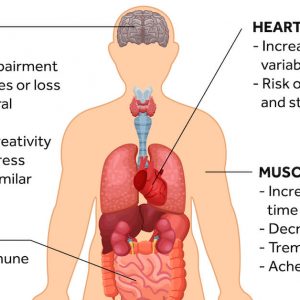
Getting enough sleep? Eight is the magic number of hours society says you need to survive the day. But even if you hit that number, restful sleep eludes many and leads to poor sleep quality and bad dreams.
What are your dreams telling you about your quality of sleep? Does poor sleep quality lead to bad dreams? Is better sleep quality linked to good dreams? Better sleep quality certainly lessens your chances of having nightmares.
What Happens When You Dream?
Dreams stem from the subconscious, but not much is known about why and how they occur. However, there are correlations and theories about how your daily activities and sleep quality influence your dreams.
What if you can’t remember your dreams, at all? Everyone dreams.
When you sleep, there are four stages you pass through, including two phases of light sleep and a third, heavier phase of sleep where a drill couldn’t wake you. REM is the fourth stage where half of sleep time is spent and dreaming often comes into play. Your breathing rate increases, and your eyes move under your eyelids. These cycles repeat every 90 minutes or so.
When your sleep patterns are separated by three- to four-hour bursts of sleep, you usually head straight for REM and remember your dreams more easily. Most people report similar dreams: falling, flying, teeth falling out, or walking around naked at school or work, and some share dreams. Others claim the ability to lucid dream, a period where you are conscious enough to participate in your dreams, between the stages of REM and waking up.
What Does It Mean When Nightmares Reoccur?
You don’t outgrow nightmares as an adult. That’s just something nice your parents tell you. One out of every two adults have nightmares occasionally, and between two to eight percent of adults are plagued by nightmares. There are several causes associated with recurring nightmares:
- Stress, anxiety or fear
- Emotional issues
- Trauma
- Medications and drugs
- Illness with a fever
- Eating right before bed
Stress, Anxiety and Fear Influence Nightmares
Did you recently move out of the state or country? Have you failed at a particular project or goal? Are you grieving the death of a family member? Even the simplest of things can trigger a nightmare.
If you can’t speak up in a dream, perhaps there’s something you’re not speaking up about in real life. That’s when you need to start looking at what’s happening in the dream:
- Where are you?
- What are you doing?
- What can’t you do?
- What’s strongest sense in your dream?
- What can you link that to in your daily life?
Stress, anxiety or fear often exists years after a triggering event. Adults who have long since graduated from high school or college report nightmares of taking exams.
It’s not yet clear to scientists if nightmares triggered by stress and anxiety are more casually linked or are an expression of an underlying issue. If nightmares become persistent, it’s important to speak with a health professional. Studies have linked deeper emotional issues with chronic nightmares.
Emotional Issues Influence Nightmares
People with emotional disturbances or events in the past have an increased chance of having recurring nightmares. Adults who possess issues of distrust, alienation or estrangement are more likely to have chronic nightmares. In one Finnish study, 28 percent of those clinically diagnosed with severe depression reported frequent nightmares than the four percent sample average.
Highly creative individuals and those who are extremely forgiving (with limited personal boundaries) have chronic nightmares linked to stress and anxiety.
It’s important to express emotional issues and seek treatment if needed. Otherwise, your dreams will express them for you.
Trauma Influences Nightmares
Traumatic experiences drastically influence the frequency and recurrence of chronic nightmares. 52 percent to 96 percent of those diagnosed with PTSD have more nightmares compared to three percent of the general public. Those who have gone through issues of domestic violence or survived natural disasters are more prone to having nightmares.
The combination of emotional and physical trauma greatly influences your dreams and sleep quality.
Medications and Drugs Influence Nightmares
Medications do influence nightmare frequency, especially those that influence neurotransmitters.
The U.S. National Library of Medicine advises that the following impacts the occurrence of nightmares:
- Sudden alcohol withdrawal or drinking too much alcohol
- New drugs prescribed by a health care provider
- Illegal street drugs
- Over-the-counter sleep aids
- Stopping certain drugs, including sleeping pills or narcotic pain pills
Research medications and drugs. Ask your health care professional questions about the side-effects of what you are taking.
Illness with a fever or eating a meal right before bed can also trigger nightmares. So, be careful about when you eat and how you take medications and drugs while sick.
Good Sleep Habits Can Improve Dream and Sleep Quality
What’s the point of dreams if you only have nightmares? Do good dreams even matter?
All dreams matter. Dreaming helps people to absorb facts and consolidate memories. Harvard Medical School found that if you learn a task and sleep on it, you’re ten times more efficient at it than if you hadn’t slept at all. Rubin Naiman, a sleep and dream expert says, “Good dreaming contributes to our psychological well-being by supporting healthy memory, warding off depression, and expanding our ordinary limited consciousness into broader, spiritual realms.”
Here are a few tips for establishing good sleep habits:
- Maintain a regular sleep-wake schedule
- Establish a pre-bed ritual to ease yourself into sleep
- Go to sleep only when tired
- Only use your bed for sleep
- Have a comfortable sleeping environment
- Limit light exposure before bed
- Don’t nap close to bedtime
- Eat and drink enough — but not right before sleep
- Exercise regularly — but not right before sleep
- Avoid caffeine, nicotine and other drugs that may interfere with sleep
- Stop watching your clock tick by at night
If these sleep tips aren’t enough to assist with improving sleep quality, you may have a sleep disorder or underlying issue preventing you from resting well upon waking. Speak with a qualified healthcare professional about sleep disorders, hypnotherapy, counselling or other treatment method that may assist you.
Dreams are Nothing to Fear
Good sleep habits mean improved sleep quality and better dreams. Everyone has nightmares sometimes. It’s only a concern when nightmares recur or become chronic, leading to poor concentration and negativity in your relationships. Sleep and health are intrinsically linked.
Dreams shouldn’t be avoided — they offer a deeper look at our lives and health. So what are your dreams telling you?








Leave a Reply